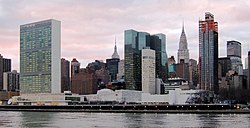
Back UN-Sekretariat ALS الأمانة العامة للأمم المتحدة Arabic Secretaría Xeneral de Naciones Xuníes AST संयुक्त राष्ट्र सचिवालय AWA Birləşmiş Millətlər Təşkilatının Katibliyi Azerbaijani БМО Секретариаты Bashkir Сакратарыят ААН Byelorussian Сакратарыят ААН BE-X-OLD Секретариат на ООН Bulgarian জাতিসংঘ সচিবালয় Bengali/Bangla
 | |
 United Nations Headquarters in New York City | |
| Formation | 1945 |
|---|---|
| Type | Primary Organ |
| Legal status | Active |
Secretary-General | António Guterres |
Deputy Secretary-General | Amina J. Mohammed |
| Website | un.org/secretariat |
The United Nations Secretariat is one of the six principal organs of the United Nations (UN),[1][2] The secretariat is the UN's executive arm. The secretariat has an important role in setting the agenda for the deliberative and decision-making bodies of the UN (i.e., the General Assembly, Economic and Social Council, and Security Council), and the implementation of the decision of these bodies. The secretary-general, who is appointed by the General Assembly, is the head of the secretariat.[2]
The mandate of the secretariat is a wide one. Dag Hammarskjöld, the UN's second secretary-general, described its power as follows: "The United Nations is what member nations made it, but within the limits set by government action and government cooperation, much depends on what the secretariat makes it. It has creative capacity. It can introduce new ideas. It can, in proper forms, take initiatives. It can put before member governments findings which will influence their actions".[3]
The United Nations Department of Political Affairs, which has a role analogous to a ministry of foreign affairs, is a part of the secretariat. So is the Department of Peace Operations. The secretariat is the main source of economic and political analysis for the General Assembly and Security Council; it administers operations initiated by UN's deliberative organs, operates political missions, prepares assessments that precede peacekeeping operations, appoints the heads of peacekeeping operations, conducts surveys and research, communicates with non-state actors such as media and non-government organizations, and is responsible for publishing all of the treaties and international agreements.[2][4][5]
- ^ "Main Organs". United Nations. Archived from the original on 12 April 2015. Retrieved 9 April 2015.
- ^ a b c "UN Secretariat". United Nations. 18 November 2014. Retrieved 9 April 2015.
- ^ Dag Hammarskjöld (1968). Hammarskjöld: The Political Man. Funk & Wagnalls.
- ^ Novosad, Paul; Werker, Eric (9 January 2014). "Who Runs the International System? Power and the Staffing of the United Nations Secretariat" (PDF). Paul Novosad. Archived (PDF) from the original on 13 April 2015. Retrieved 9 April 2015.
The article by Harvard Business School, researchers, Views the staffing of the Secretariat as a globalized power struggle.
- ^ United Nations. (2011). Official web site http://www.un.org/en/mainbodies/secretariat/
© MMXXIII Rich X Search. We shall prevail. All rights reserved. Rich X Search